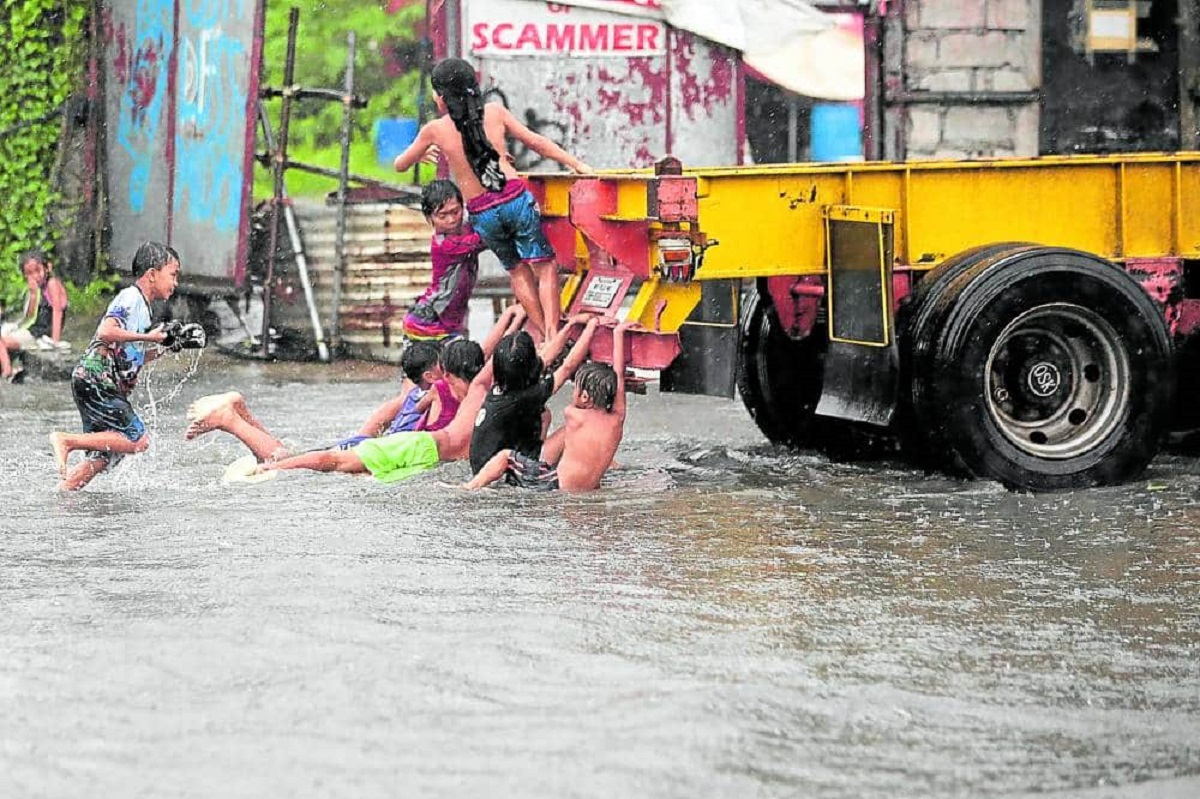
PLAYGROUND Children play in floodwaters in Isla Puting Bato in Tondo, Manila, amid heavy rains late last month. —Grig C. Montegrande
MANILA, Philippines — Metro Manila mayors will be asked to “take decisive action” by imposing a ban on swimming in floodwater following a wave of leptospirosis cases in the capital region, according to the president of the Metro Manila Council (MMC).
MMC president and San Juan City Mayor Francis Zamora said on Tuesday he planned to introduce a resolution urging local government units (LGUs) to enact the ban to prevent residents from having contact with leptospirosis-causing bacteria in the urine of infected animals, especially rats.
READ: Leptospirosis cases on the rise with 255 new patients, says DOH
“Each respective LGU will have the authority to impose fines or any penalties they deem as appropriate, at their own discretion for violations of this prohibition,” he said.
In a separate statement, Health Secretary Teodoro Herbosa recommended that all flood-prone LGUs legislate a ban on swimming in dirty floodwater, as he expressed frustration with Filipinos’ failure to heed regular advisories intended to prevent the spread of the deadly disease.
‘Behavior problem’
“The surge in leptospirosis cases is not a communication problem, it’s a behavior problem. We need a [behavior change],” the Department of Health (DOH) chief said.
“Leptospirosis is an old public health issue that we have failed to address… People should have been educated even before. In other countries, their people do not swim in floodwater because they know that it is dirty,” he said.
According to Herbosa, the number of leptospirosis cases reached “epidemic thresholds” in the National Capital Region, particularly in Quezon City and Manila, as well as in Central Luzon and Calabarzon (Cavite, Laguna, Batangas, Rizal, Quezon) regions, weeks after severe flooding due to the southwest monsoon and Supertyphoon “Carina” (international name: Gaemi) in July.
“I recommend, especially to flood-prone local government units, that they should pass ordinances that prohibit swimming and playing in floodwater. The local chief executives should strictly enforce these,” he said.
In San Juan, Zamora said he would be “certifying as urgent” the enactment of an ordinance imposing the ban.
Both children and adults are covered by the proposed ordinance on metropolitan LGUs.
For minors who violate the proposed ban, the LGUs will be authorized to hold the parents or guardians liable for the corresponding penalties, Zamora said.
“This accountability is essential to ensure that parents take the necessary precautions to prevent their children from engaging in activities that may endanger their health and the health of others,” he said.
Based on the latest data from the DOH, 255 new leptospirosis cases were recorded from July 21 to Aug. 3, higher than the 217 cases from July 7 to 20.
From Jan. 1 to Aug. 3, the total number of leptospirosis cases nationwide stood at 2,115, with 224 deaths.
Leptospirosis is a disease caused by the Leptospira bacteria found in water contaminated by the urine of affected rats. The bacteria can survive in contaminated water or soil for weeks or months.
People may get leptospirosis by wading through floodwaters or handling soil, dirt, or mud after a flood, with or without visible wounds, through the exposed skin.
The disease poses a major health problem in the country, especially during the rainy season from June to November.
Among its mild flu-like symptoms are fever, headache, chills, body or muscle aches, vomiting or nausea, and yellowed skin and eyes. But about 5 percent of cases progress to more severe complications, such as Weil’s Syndrome, which can lead to kidney failure and lung hemorrhage.